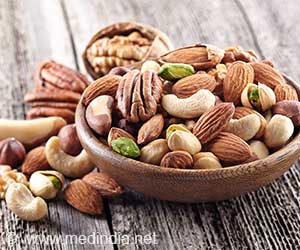A British study revealed that increasing fish oil supplementation can help reduce risk of metabolic syndrome in risk variant carrier older adults.

Studies have found that some ADIPOQ gene variants are responsible for lower adiponectin concentrations in the blood. Decreased adiponectin concentration means less efficient fat burning and less glucose utilization and therefore a greater risk of developing type-2 diabetes and obesity. However, this happens only in those people who carry this ‘risk variant’ of ADIPOQ gene.
There are ways to increase blood adiponectin levels. Interestingly, studies have found evidence of gene - diet interactions in obesity. They claim that people who are risk variant carriers can improve their adiponectin through certain nutrients, especially fatty acids.
So, Aseel AlSaleh and colleagues at Kings College London, School of Medicine, London, conducted a trial to find out how dietary n3 PUFAs such as fish oil interacts with adiponectin gene (ADIPOQ) variant to affect blood adinopectin concentration.
This study included 142 healthy men and 225 women aged 45–70 years for 12 months from which only 310 people completed the study.
The researchers randomly assigned daily doses of 0.45, 0.9, and 1.8 g 20:5n3 and 22:6n3 (1.51:1), or placebo, in 3 capsules taken as dietary supplements. Oily fish intake was restricted to 1 portion per month throughout the 12-month period.
DNA testing of five ADIPOQ gene variants [−11391 G/A (rs17300539), −11377 C/G (rs266729), −10066 G/A (rs182052), +45 T/G (rs2241766), and +276 G/T (rs1501299)] was done.
‘If aging is associated with development of adiponectin resistance, the increase observed in only the oldest participants may reflect an ability to respond only after a high intake of n3 PUFA,’ they analyzed.
They also found that the interaction among SNP +45 T/G genotype, treatment, and age was only nominally significant as far as serum adiponectin is concerned. Earlier studies have shown that +45 TT genotype (risk gene variant) is associated with lower serum adiponectin and increased risk of type 2 diabetes, obesity, and adverse metabolic marker. The researchers thus reasoned ‘interaction of the +45 TT genotype with high-dose n3 PUFA supplements may serve a protective function in susceptible older individuals’.
They concluded that older people who have +45 TT genotype may reduce the risk of metabolic syndrome associated type 2 diabetes and obesity if they increase the consumption of fish oil.
‘A recommendation to +45 TT homozygotes to increase consumption of oily fish to maintain adiponectin concentrations with advancing years would be justified,’ they reported.
The study is published in Journal of Nutrition.
References:
http://jn.nutrition.org/content/early/2013/05/08/jn.112.172585.full.pdf
http://www.gbhealthwatch.com/GND-Obesity-T2DM-ADIPOQ.php
Source-Medindia
 MEDINDIA
MEDINDIA




 Email
Email










